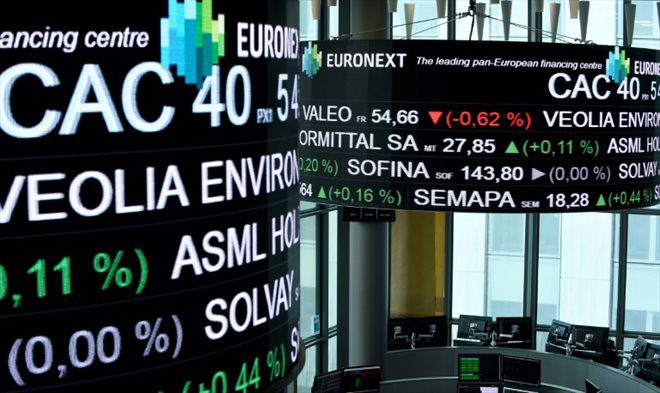The control room of Euronext, the company that manages the Paris Stock Exchange (AFP/Archives/ERIC PIERMONT)
The New York Stock Exchange rebounded on Thursday, hoping to see the end of monetary tightening approaching while European indices less welcome the announcements of rate hikes in Switzerland, Norway and the United Kingdom.
The New York Stock Exchange started the session in the green on Thursday, on the way to a rebound after the fall of the previous day: the Dow Jones index gained 0.71%, the Nasdaq, dominated by technology, 1.26% and the S&P 500 index 0.93% around 2:50 p.m. GMT.
In Europe, the indices moved close to equilibrium in Paris (-0.10%), Frankfurt (-0.15%) and Milan (-0.21%). London fell 0.76% after the Bank of England’s decision to raise rates again to counter inflation.
The US Federal Reserve (Fed) raised its key rate by only a quarter of a percentage point on Wednesday in a context undermined by the banking crisis.
And for the rest, the majority of the 18 Fed officials are anticipating an additional quarter-point rate hike.
If it hadn’t raised rates at all, “the markets would have received the signal that financial stability was not just about the anti-inflation rhetoric that has been going on for nearly a year, and that there would have been other underlying concerns in the banking industry,” said Eva Sun-Wai, managing director at M&G.
After the recent failure of Silicon Valley Bank (SVB), the US authorities took steps to ensure the withdrawal of all deposits from SVB and Signature Bank.
The Bank of England (BoE) also raised its key rate by 0.25 points on Thursday, mimicking the Fed and the Bank of Norway, while warning that “if ‘inflationary’ pressures persist, further policy tightening monetary would be necessary”.
The Swiss National Bank (SNB), which worked to secure the emergency takeover of Credit Suisse by its rival UBS this weekend, opted for a 50 basis point hike, like the European Central Bank there. a week old.
Shares of Credit Suisse (-2.60%) and UBS (-3.23%) were down sharply and the banking sector of the broader Stoxx Europe 600 index was down 1.54% around 2:50 p.m. GMT.
On the bond market, the borrowing rates of European states fell: the German 10-year debt rate was worth 2.25% against 2.32% at the close of the previous day and the British equivalent stood at 3 .42%.
On the side of currencies and oil
The pound gave up much of its gains against the dollar on Thursday, after the Bank of England’s decision to proceed with another rate hike to counter inflation.
Around 1:50 p.m. GMT, the British currency took 0.36% to 1.2313 dollars and 0.12% to 88.37 pence for one euro. Earlier, it hit its highest in almost two months against the dollar, at $1.2344 to the pound.
The dollar, meanwhile, fell against other major currencies, penalized by the slightly more cautious tone of the Fed in the wake of the turbulence in the banking sector.
Against the euro, the US currency lost 0.24% to 1.0882 dollars per euro after falling to 1.0930 dollars, its lowest since early February.
Both the Norwegian krone and the Swiss franc hardly reacted after the announcements from their respective central banks.
Oil prices are falling: the barrel of Brent from the North Sea for delivery in May lost 0.43% to 77.02 dollars, while the barrel of American WTI at the same maturity fell by 0.35% to 71.17 dollars around 2:00 p.m. GMT.
© 2023 AFP
Did you like this article ? Share it with your friends with the buttons below.




